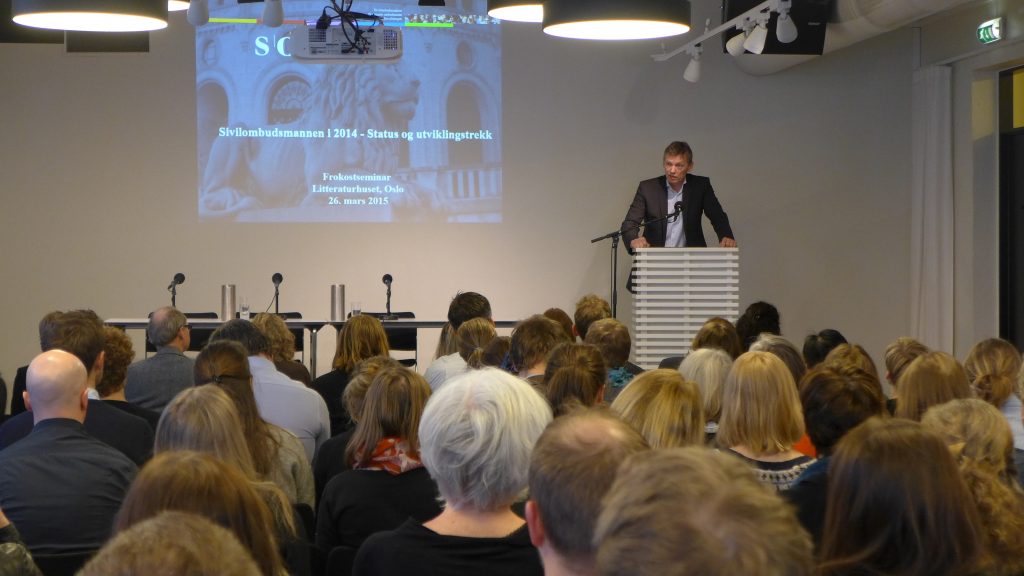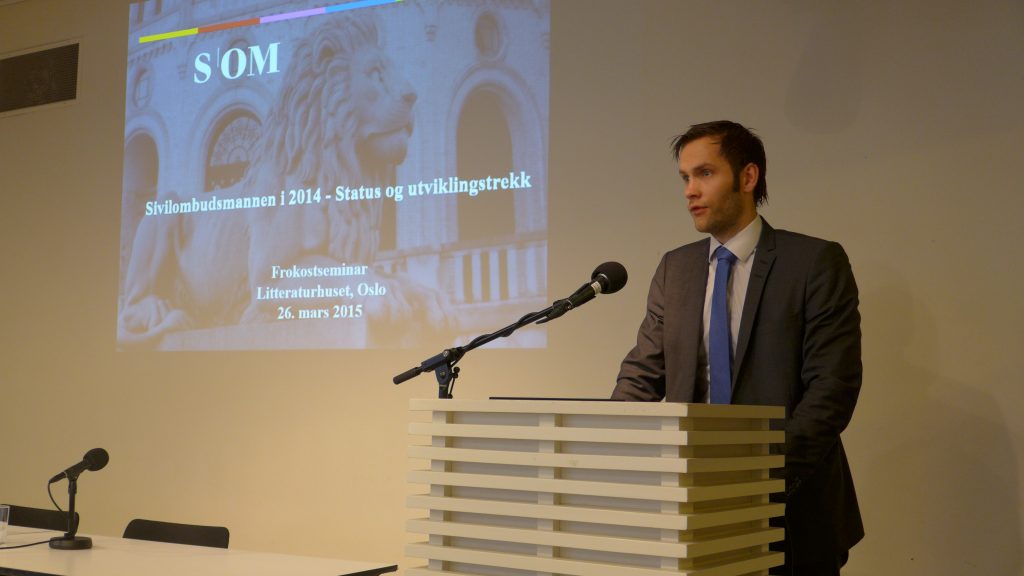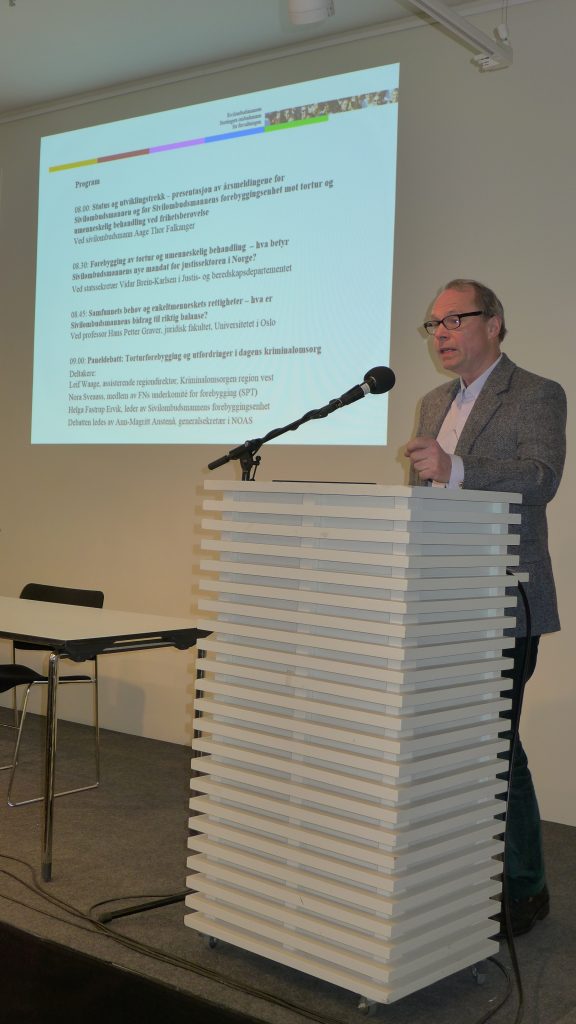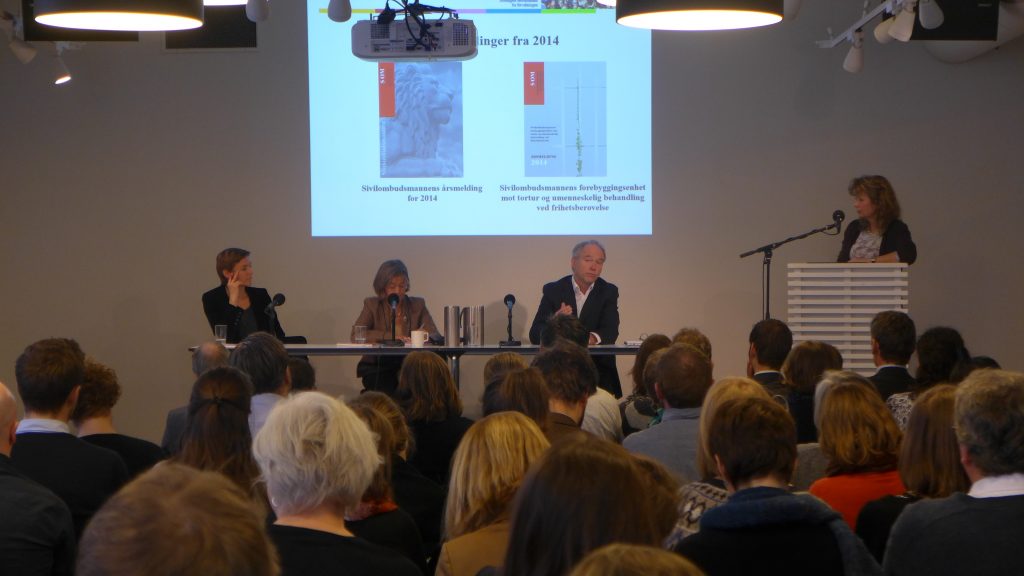Parliamentary Ombudsman Aage Thor Falkanger opened the meeting with a review of his first nine months in office. He discussed some of his views and perspectives on the Ombudsman scheme, his role in relation to the public administration, and the issues to which he intends to devote special attention going forward. Among other things, he emphasised the need to raise public awareness of the Parliamentary Ombudsman and his role, the need to address more issues on his own initiative, and the need to reduce case processing times further. In particular, the Ombudsman’s resources should be invested in focusing public attention on important matters of principle. The Ombudsman’s emphasis on priority-setting is driven by the objective of becoming even more effective in protecting citizens against injustice.
The Ombudsman also spoke on one of the focus topics from his annual report for 2014, namely legal safeguards in the context of the Norwegian Labour and Welfare Administration (NAV) work policy as applied to work capacity assessment allowance.
Mr Falkanger then reported the principal findings from the NPM’s 2014 annual report, and its findings from visits made to places of detention thus far.

State Secretary Vidar Brein-Karlsen from the Ministry of Justice and Public Security congratulated the Parliamentary Ombudsman on the NPM’s first annual report, stating that the establishment of the NPM was a positive step in Norway’s efforts to strengthen its implementation of the Convention against Torture.
The Ombudsman’s recommendations will be useful for the justice sector, and some immediate measures have already been put into place. The State Secretary agreed with the NPM’s conclusion that several Norwegian prisons are housed in unsuitable buildings. Nevertheless, conditions can be improved, as shown by the changes made to one of the cells in Tønsberg police custody facility.
Mr Brein-Karlsen also encouraged further discussion of the issues associated with search practices in prisons and police custody facilities. Body searches raise both practical issues and questions of principle, and require the balancing of competing considerations. The State Secretary rounded off by saying that he looked forward to continued dialogue with the NPM.

Professor Hans Petter Graver of the Faculty of Law at the University of Oslo asserted that it was high time that Norway’s use of detention is overseen more closely. Since 2010, the National Human Rights Institution’s “Yearbook for Human Rights in Norway” has addressed issues such as breaches of time limits for stays in police custody, the excessive use of isolation, the use of force in the psychiatric context and conditions for elderly persons in nursing homes.
Inadequate legal oversight of institutions where individuals are deprived of their liberty can easily become a problem for society at large, and pave the way for authoritarian styles of government of the type observed in Chile, and in the USA in connection with the Guantanamo Bay detention facility. The NPM is building on a tradition of safeguarding against such undesirable developments in Norway.
Documenting negative findings, as is done in the reports of the NPM, is of great importance.
Professor Graver then commented on the NAV cases which the Ombudsman had highlighted in his introduction. Professor Graver had chaired the commission on the Act on Social Services in the Labour and Welfare Administration (the NAV Act), and noted that the resulting report focused primarily on the organisational implications of the NAV reform. However, the Ombudsman’s statements regarding labour market measures and work capacity assessment allowance illustrate the importance of considering how such reforms impact on legal safeguards.

Ann-Magritt Austenå, Secretary-General of NOAS, the Norwegian Organisations for Asylum Seekers, then chaired a panel debate on the prevention of torture and the challenges currently facing the Correctional Services.

Helga Fastrup Ervik, head of the NPM, opened the debate, remarking on the many examples of good practice observed by the NPM in its work. Crowded prisons, however, pose problems. In addition, prisoners are often admitted after regular working hours, isolation is widely used, and there are great variations in the health care services provided. The large number of foreign nationals in Norwegian prisons further adds to the challenges.
The NPM’s mandate covers almost 2,000 places of detention. The fact that the mandate encompasses multiple sectors is an advantage, as it allows the NPM to draw the authorities’ attention to cross-sectoral problems. Redressing these problems, however, is the responsibility of the authorities.
High occupancy rates in prisons raise additional problems of which many people are unaware. The lack of spaces in communal sections sometimes leads to prisoners spending longer in the restricted section. Moreover, inadequate staffing creates a sense of insecurity which may, in turn, cause prisoners to isolate themselves.
Access to interpreting services is also essential. Practical, new ideas are needed. One possibility is to examine whether digital solutions can provide a satisfactory solution.
Leif Waage, Deputy Regional Director of the Correctional Services, Region West, said that good conditions for inmates benefit both prisoners and victims of crime. Although Bergen prison used to be one of the best prisons in Europe in terms of effective service of sentence, the trend in recent years has been negative, with more prisoners suffering from severe mental illness in Bergen prison than before. An American study concluded that there are ten times more mental health patients in American prisons than in the country’s psychiatric hospitals. Such statistics are of concern. Prisoners with mental health problems are kept isolated or placed in security cells.
Existing problems in Norwegian mental health care are influencing prison conditions. Capacity problems and staff shortages are undermining morale in the Correctional Services, and compounding deteriorating conditions in prisons. Good prisons are a sound investment for society at large.
A further, major challenge is presented by prisoners with poor language skills and cultural understanding. One of the numerous issues raised is how such prisoners can be properly assessed with regard to criminal responsibility.
Nora Sveaass, a member of the UN Subcommittee on the Prevention of Torture and other Cruel, Inhuman or Degrading or Punishment (SPT), congratulated the Parliamentary Ombudsman on setting up the NPM just over 18 months after Norway’s ratification of the Optional Protocol to the UN’s Convention against Torture (OPCAT). Although Norway was relatively late in ratifying OPCAT, work to implement it is well under way.
SPT is a UN treaty body in its own right, and may visit other countries that have ratified OPCAT to conduct both announced and unannounced visits. SPT always works in close cooperation with the national preventive mechanisms, which send their annual reports to SPT. Moreover, SPT works closely with other international monitoring mechanisms, such as the European Committee for the Prevention of Torture (CPT).
SPT will work with the NPM in connection with any visit to Norway.
SPT is currently especially concerned about the detention of immigrants, an area where several European countries are hard-pressed. Interpreting services are also important in all types of institutions where persons are deprived of their liberty.